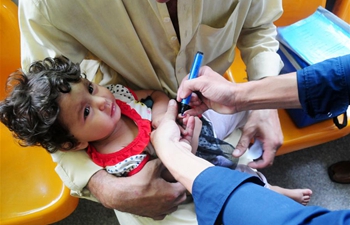BEIJING, Aug. 27 (Xinhua) -- Chinese researchers have revealed how the gene regulatory network and epigenetic mechanisms potentially control the human embryo implantation process.
After a sperm fertilizes an egg, they become a totipotent embryo which is capable of differentiating into an unlimited number of specialized cell types. It travels and attaches itself into the wall of the uterus at about the seventh day, which is called implantation. Then, it is possible for the embryo to initiate a successful pregnancy.
Implantation failure is a major cause of early pregnancy loss in humans. Due to the difficulty of obtaining human embryos early after implantation, rodent and monkey embryos were usually used in previous studies, which cannot accurately show regulatory mechanisms of implantation in humans.
In the study published in the journal Nature, researchers from Peking University and Peking University Third Hospital observed and analyzed human peri-implantation embryos in vitro culture system for the embryo development after implantation.
The researchers reconstructed the process of human embryo implantation, generating a map of gene regulatory network and DNA methylation at whole genome-scale.
DNA methylation is a chemical alteration to DNA in mammals that controls how active a gene is within a cell. During peri-implantation development, embryonic cells are directed toward their future lineages, and DNA methylation poses a fundamental epigenetic barrier that guides and restricts differentiation.
The researchers said that a mother-to-offspring connection is prepared to be established during implantation. The first three cell lineages produced by the embryo presented different increasing paces of DNA methylation.
For instance, some hormone-related genes are expressed in trophoblasts, cells forming the outer layer of the cellular mass of the embryo.
The researchers said this study provides insights into the complex molecular mechanisms that regulate the implantation of human embryos in the hope of inspiring the reproductive medicine.
"With the black box of this unique embryonic developmental stage being gradually uncovered, we are about to provide the possibility of early diagnosis and screening of defective embryos before the embryo transplantation," said Tang Fuchou from Peking University, corresponding author of the study.
The researchers terminated the in vitro culture of embryos before day 14 in accordance to the international ethical guideline.

















